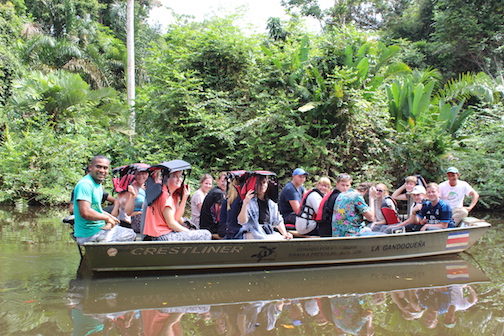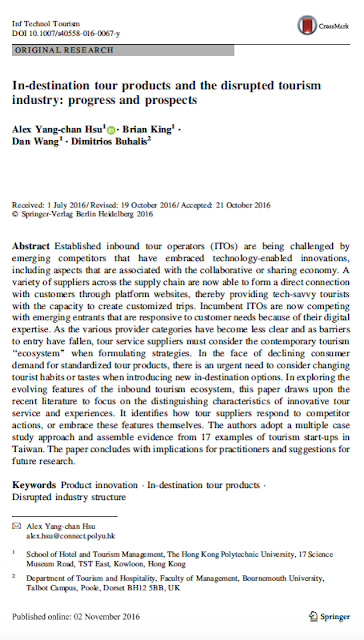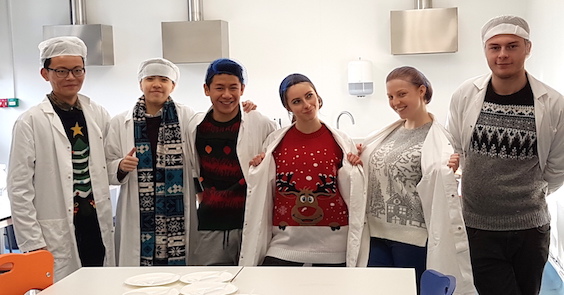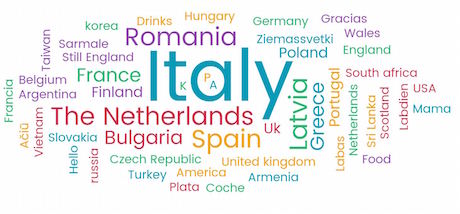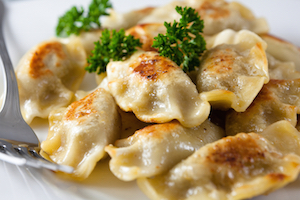New Publication: Tourists’ representations of coastal managed realignment as a climate change adaptation strategy
Johanna Schliephack, and Janet E. Dickinson 2017 Tourists’ representations of coastal managed realignment as a climate change adaptation strategy Tourism Management Volume 59, April 2017, Pages 182–192 http://dx.doi.org/10.1016/j.tourman.2016.08.004
Highlights
- •Tourists have a poor understanding of managed realignment.
- •Managed realignment is anchored to existing ideas of coastal protection.
- •There is some variation in the representation aligned to amenity use values.
- •The representation has the power to mobilise the public in various ways.
Abstract
In coastal destinations climate change adaptation is needed to address coastal erosion due to a combination of sea level rise and more frequent extreme weather events leading to loss of natural features and tourism infrastructure. Managed realignment is increasingly adopted as a strategy to address coastal change; however, this has often proved a contentious strategy with stakeholder groups. This study explores tourists’ representational framework of managed realignment and how this frames understanding of the concept, understanding of how coastal resources might change and implications for future visitation. Data compiled using a questionnaire adopted a social representations theory perspective to analyse how collective tourists’ ideas may serve to mobilise the public in various ways. In general tourists have a poor understanding of managed realignment anchored to historic coastal management strategies and contextualised by use values with consequent implications for tourism planning and coastal management decision making.
Keywords : Climate change; Managed realignment; Social representations; Coastal erosion
Dr Susanna Curtin Expedition to Costa Rica
Expedition to Costa Rica
Dr Susanna Curtin Expedition to Costa Rica
On the 1st November 2016, Dr Susanna Curtin joined Drs. Rick Stafford, Anita Diaz and Phillipa Gillingham on a ten-day student expedition to Costa Rica. Although Costa Rica is a renowned world leader in conservation with 25% of its landmass designated to a national park system comprised of protected tropical dry forest, cloud forests, wetlands and marine reserves, there are a number of economic and social pressures that threaten this environmental sustainability. The purpose of this expedition was to research the conservation projects and policies which co-exist alongside the large scale banana plantations, coffee, other agriculture and tourism industries that are essential to their economy. The students’ brief was to evaluate the positive and negative impacts of these important activities on conservation; paying particular attention to the different perspectives presented by various stakeholders.
Our experiences began at the Gandoca Project which is situated in a laid back coastal town on the Caribbean. A fine black sandy, windswept beach is the backdrop for Gandoca’s turtle conservation. Whilst November is not the season for turtles to come ashore and lay their eggs. During our stay here in small wooden cabins, we studied the flora and fauna of the area on foot in the primary rainforest and on boats through mangrove-lined tributaries. There was also work to be done planting palms and mangroves to protect the beach from erosion from the vicious storms that have begun to claim the coastline. We also cleared the litter to rid the beaches of the alarming array of plastics which threaten marine wildlife.
From here it was north to Cahuita national park for snorkelling on a coral reef and walking through the tropical rainforest which lines the shore. Here we experienced tourism infrastructure but also an amazing list of reptiles, mammals, insects and plants; an example of where tourism and nature can happily co-exist. The latter part of our journey consisted of volcanoes, a kilometre of zip wiring high over the jungle, hot springs and Costa Rican hospitality. Overall, an excellent experience for everyone and a good blueprint for a student expedition.
New article on Disruption technologies in the tourism industry
ORIGINAL RESEARCH
Hsu, A., King, B., Wang, D., Buhalis, D., 2016, In-destination tour products and the disrupted tourism industry: progress and prospects, Information Technology & Tourism, Vol 17, pp.1-21.
https://doi.org/10.1007/s40558-016-0067-y and https://goo.gl/ntNBA1
Abstract
Established inbound tour operators (ITOs) are being challenged by emerging competitors that have embraced technology-enabled innovations, including aspects that are associated with the collaborative or sharing economy. A variety of suppliers across the supply chain are now able to form a direct connection with customers through platform websites, thereby providing tech-savvy tourists with the capacity to create customized trips. Incumbent ITOs are now competing with emerging entrants that are responsive to customer needs because of their digital expertise. As the various provider categories have become less clear and as barriers to entry have fallen, tour service suppliers must consider the contemporary tourism ‘‘ecosystem’’ when formulating strategies. In the face of declining consumer demand for standardized tour products, there is an urgent need to consider changing tourist habits or tastes when introducing new in-destination options. In exploring the evolving features of the inbound tourism ecosystem, this paper draws upon the recent literature to focus on the distinguishing characteristics of innovative tour service and experiences. It identifies how tour suppliers respond to competitor actions, or embrace these features themselves. The authors adopt a multiple case study approach and assemble evidence from 17 examples of tourism start-ups in Taiwan. The paper concludes with implications for practitioners and suggestions for future research.
Keywords: Disruption, technology, Product innovation, In-destination tour products, Disrupted industry structure
Introduction
Periods of tourism industry development have often coincided with technological advances which have challenged the position and roles of established stakeholders (Hjalager 2015). The progression of information communication technology (ICT) has been notable for facilitating a process of travel agency disintermediation (Buhalis and Licata 2002). The emergence of online travel agents (OTAs), combined with smart gadgets, mobile commerce, location-based services, data analytics, and the sharing economy have empowered tourists to co-create their journey experience with destination-based suppliers of tour components. Moreover, through the processes of globalization, international companies have offered greater freedom for citizens to engage in exploration beyond existing boundaries (Amadeus 2015). While some tourists may still prefer the convenience of group tours in a one-stop purchase, others expect more interactive and customized services (Dwyer et al. 2009). Moreover, the demand for technology-enabled travel experiences is increasing (Neuhofer et al. 2015) in this emerging smart tourism ecosystem (Gretzel et al. 2015). In the case of Taiwan, most visitors prefer to travel as free and independent travellers (FITs) and demand for group tours is falling (Taiwan Tourism Bureau 2015). It is becoming imperative for destination-based service providers to renovate their product range with a view to meeting changing needs within the FIT market, notably in the case of inbound tour operators (ITOs). While digital innovation has revolutionized many industries, Dawson et al. (2016) investigated the vulnerability of businesses through the major digital impacts on demand and supply, involving both incremental and radical changes. While technology is providing solutions to the customization of individual needs, modest adjustments are happening when market demand is fulfilled by creative suppliers who manage their costs more efficiently through the use of digitalization and external resources. Structural shifts are also occurring with the creation of ‘‘new value propositions, business systems, and hyperscaling platforms (Dawson et al. 2016, p. 1)’’ through technology-enabled innovations. Traditional ITOs are relatively vulnerable because the value that the sector creates is heavily dependent on information asymmetry and product bundling. Tourism stakeholders are being increasingly confronted by the disruptive power of the so-called collaborative or sharing economy (henceforth the sharing economy) (Euromonitor International 2014; Fraiberger and Sundararajan 2015). The advent of the sharing economy has been realized through novel platforms which address tourist needs by linking peerto-peer resources (Fraiberger and Sundararajan 2015). Driven by platform-based initiatives such as Airbnb and OTAs that include Expedia, the platform business model connects tourists directly with suppliers in the destination (Alstyne 2016).
Visitors are provided with alternative options to customize their journeys, thereby creating an opportunity for ITOs and tour service providers to offer individual components through the liberalization of distribution channels via global platform enterprises (Accenture Digital 2016). Nevertheless, while incumbent tourism stakeholders have traditionally designed their conventional tour products around the economic logic of providing multi-layered channels (Stamboulis and Skayannis A. Y. Hsu et al. 2003), they must now identify the emerging product features within the contemporary ‘‘smart’’ tourism ecosystem. Drawing upon the existing literature and on real-life examples, the authors of the present paper aim to explore how in-destination tour providers innovate their product offerings. In particular, while touring services are often non-standardized, the authors argue that identifying such features would benefit tourism stakeholders in light of the emerging platform-based business model such as the sharing economy. There is an evident need for the innovative in-destination tour suppliers to supplement the platform enterprises and to provide tourists with better solutions. If there is no innovation of in-destination services and products, it is likely that established tour suppliers will progressively cede their market position in the face of a digitally disrupted industry and shrinking demand for more conventional tour products.
So proud of our Bournemouth University graduates – Faculty of Management Tourism Hospitality Events and Sports
So proud of our Bournemouth University graduates – Faculty of Management Tourism Hospitality Events and Sports
VeggiEAT is a 4 year EU funded project among four countries (Denmark, France, Italy and United Kingdom)
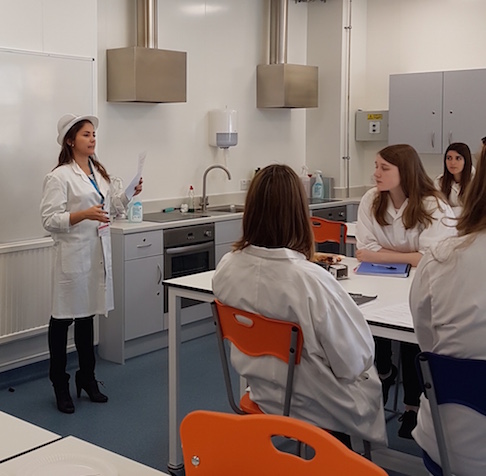 My name is Vanessa Mello Rodrigues, and I am a Brazilian Registered Nutritionist. Currently I am a Marie-Curie Post-doctoral research fellow within the Foodservice and Applied Nutrition Research Group and working for one year on the project VeggiEAT, coordinated by Prof. Heather Hartwell.
My name is Vanessa Mello Rodrigues, and I am a Brazilian Registered Nutritionist. Currently I am a Marie-Curie Post-doctoral research fellow within the Foodservice and Applied Nutrition Research Group and working for one year on the project VeggiEAT, coordinated by Prof. Heather Hartwell.
VeggiEAT is a 4 year EU funded project among four countries (Denmark, France, Italy and United Kingdom) encouraging a more sustainable diet based on vegetables. One of my first jobs was performing a sensory test with 56 first year Hospitality students evaluating the difference in preference between frozen and canned vegetables. A frozen and canned sample for both peas and sweet corn were presented to the participants, and they were asked to taste them and indicate how much they liked them on a 9 point Likert scale (ranging from 1 ‘I do not like it all’ and 9 ‘I like it a lot’). We also asked for open ended comments.
The analysis showed that for peas, the frozen sample was greatly more liked than the canned one, average scoring 6.0 and 2.6 points, respectively. This was mainly attributed to the more ‘vibrant colour’ and ‘firmness’ of the frozen variety, whilst the canned peas were considered ‘mushy’ and with a ‘not pleasant appearance’. The opposite was observed for sweetcorn, although both were liked, the difference between the samples was 1.6 score points on average (6.7 canned; 4.9 frozen). The main positive characteristics highlighted for the canned variety were the ‘thickness’ and ‘greater size’ of the sweetcorn.
These results are going to be further statistically evaluated and described in detail and published as a swift communication. We also aim to disseminate to industry as canned and frozen vegetables offer virtually the same nutrition as fresh, with the advantage of facilitating accessibility, storage and food safety disparities.
Merry Christmas from Food Studies preparing gluten free mince pies
Over the last few years, the interest and market in gluten-free products has expanded considerably. Increasingly space in supermarkets is being given over to “free from” products.
There was a time, not that long ago, when gluten-free food was only available on prescription – it was a medical need for a small minority of people with coeliac disease.
However, now it is main-stream and the foodservice industry not only has a regulation requirement to inform consumers of dishes that are free from gluten but there is a rising consumer base interested in the products.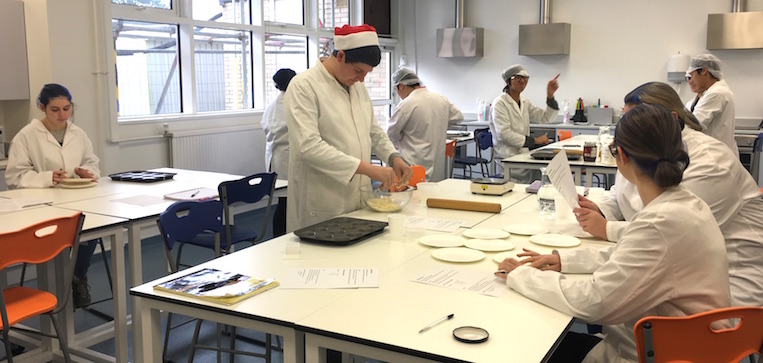
Hence the Christmas practical of making gluten free mince pies.
Dr Sean Beer creates a Buzz at Global BUzz Europe
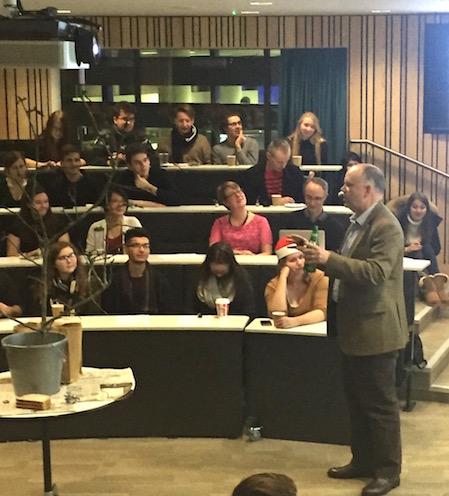 On Friday 2 December BU held a Global BUzz Europe event hosted by the European Society and the Global Hub. Along with music, food and drink (mulled wine and mince pies), student stalls and a range of speakers on European issues 80 staff and students enjoyed Sean’s take on: ‘The tastes and smells of Christmas celebrations past and present’.
On Friday 2 December BU held a Global BUzz Europe event hosted by the European Society and the Global Hub. Along with music, food and drink (mulled wine and mince pies), student stalls and a range of speakers on European issues 80 staff and students enjoyed Sean’s take on: ‘The tastes and smells of Christmas celebrations past and present’.
This involved the Boar’s Head, Singing, an apple tree, Brexit, toast, cider, Social Constructionism, more singing, Social constructivism and a large number of explosions. A good time was had and all lived to tell the tail. Wassail!!!!
This was a great event and attracted many different nationalities.
new paper Brown, L. and Paszkiewicz , I. 2016 The role of food in the Polish migrant adjustment journey Appetite
Brown, L. and Paszkiewicz , I. 2017 The role of food in the Polish migrant adjustment journey Appetite Volume 109, 1 February 2017, Pages 57–65
http://dx.doi.org/10.1016/j.appet.2016.11.024
In 2015, there were 916,000 Poles living in the UK, making them the largest group of non-UK nationals at 16.5 percent of the population. Though increasingly research has focused on the consequences of this migration for both migrants themselves and the receiving country, little research has looked at food habits. This paper will explore the role of food in the Polish migrant adjustment journey. A qualitative approach was adopted, involving semi-structured interviews with nine Polish migrants.
In this study, Polish migrants described the move to a new culture as a time of stress and loneliness. Due to a lack of money, they were forced to eat local food, which exacerbated their unease, as they found it to be tasteless and unhealthy. As soon as their financial situation improved, they reverted to a Polish diet, relying on ingredients brought from home, from London, or more recently, purchased from local Polish shops. This gave them comfort, and all participants acknowledged the vital role of food in their adjustment to life in a new culture.
Introduction
On May 1 2004, Poland joined the European Union together with seven other eastern European countries. The 2004 UK census recorded 69,000 Poles, which rose to 916,000 in 2015, making the Poles the largest group of non-UK nationals at 16,5 percent (Annual Population Survey, ONS, 2015), and constituting one of the largest migration movements in contemporary Europe. Records for the Accession Monitoring Report (Home Office, 2009) show that between 1 May 2004 and 31 March 2009, the highest proportion of approved applicants to the UK Workers Registration Scheme was from Poland (66% of the total 965,000), which means that over half a million Polish migrants registered to work in the United Kingdom. The Statistical Bulletin issued by the Department for Work and Pensions (2015) shows that in 2014 the total number of National Insurance Number registrations was 768,000, an increase of 23% on 2013. According to the Migration Observatory (MO, 2016), the Polish-born population in the UK is widely spread across the UK, although London accommodates over 390,150 Polish-born residents (4.59% of London’s population). The Midlands meanwhile is noted for hosting many industries that provide employment to about 102,473 Polish migrants, while Scotland accommodates 75,231 Poles (MO, 2015). Polish migrants to the UK are aged mainly between 20 and 24; this contrasts with the older cohorts aged 25-29 and 30-34, who tend to go to the Western European countries such as Germany (Department for Work and Pensions, 2015).
Research on Polish migrants has grown significantly over the last few years, covering a variety of topics related to the way Poles have negotiated their lives following transition to the UK. Research has focused on the social interaction patterns of Polish migrants, with Garapich (2007) and Ryan (2010) exploring social networks, and Ryan et al. (2008) and White and Ryan (2008) examining links between the origin and host country. The structure of the Polish community in the UK has been investigated by numerous authors (Brown, 2003; Spencer et al., 2007; Garapich 2007; White & Ryan, 2008; Temple and Koterba 2009). Meanwhile Rabikowska (2010) has considered the importance of traditional food to migrants, whilst Rabikowska and Burrell (2009) have explored the proliferation of Polish shops in British cities. Identity issues have been the subject of research (Kosic 2006; Eade et al. 2006; Kempny 2010; Egger 2011), related to which are studies of church attendance (Burrell, 2006), economic income and status (Eade and Grapich 2007; Bobek & Salamonska, 2008; Nowicka 2012), and language difficulties (Janta et al., 2012; Lyon & Sulcova, 2009). Finally, the extent of Polish migrant integration with the host community and other ethnic groups has been the subject of research attention (Burrell 2009; Datta and Brickell 2009; Ryan 2010; Nowicka 2012; Nowicka 2014).
This paper will explore the role of food in the Polish migrant adjustment journey. A literature search shows that there is a gap in knowledge on the role of food in the Polish migration experience. As Locher et al. (2005) point out, food and emotions are interlinked, therefore it is to be expected that it will occupy an important role in the migrant adjustment process.
Horizon 2020 funding for digital health and tourism
 The recent 2.2 million Euro project, CHARMED (Characterisation of a green microenvironment and to study its impact upon health and well-being in the elderly as a way forward for health tourism), funded under the Horizon 2020 Marie Skłodowska-Curie Actions programme aims to address the above challenges. The BU team headed by Dr Shuang Cang has an international reputation in the emerging digital health and digital tourism area. For example, one of recent papers published by Dr Cang has received about 100 citations in a short time. Digital technology is transforming healthcare, tourism and other industry sectors. There is a need for interdisciplinary teams at local, national and international levels to collaborate in order to realise potential. BU is one of the front runners in this emerging industry revolution. The BU team in this project including active researchers from three faculties has multidisciplinary knowledge which covers pattern recognition, artificial intelligence, multivariance statistics and quantitative analysis (Dr Shuang Cang, FM); digital and mobile technology (Prof Hongnian Yu, SciTech); community healthcare (Dr Carol Clark, HSS); environmental geology and ecosystem services (Prof Adrian Newton, SciTech); collaborative communities and collaborative travel (Prof Janet Dickinson, FM); hospitality management (Dr Viachaslau Filimonau, FM); and four PhD researchers who are researching in the related area.
The recent 2.2 million Euro project, CHARMED (Characterisation of a green microenvironment and to study its impact upon health and well-being in the elderly as a way forward for health tourism), funded under the Horizon 2020 Marie Skłodowska-Curie Actions programme aims to address the above challenges. The BU team headed by Dr Shuang Cang has an international reputation in the emerging digital health and digital tourism area. For example, one of recent papers published by Dr Cang has received about 100 citations in a short time. Digital technology is transforming healthcare, tourism and other industry sectors. There is a need for interdisciplinary teams at local, national and international levels to collaborate in order to realise potential. BU is one of the front runners in this emerging industry revolution. The BU team in this project including active researchers from three faculties has multidisciplinary knowledge which covers pattern recognition, artificial intelligence, multivariance statistics and quantitative analysis (Dr Shuang Cang, FM); digital and mobile technology (Prof Hongnian Yu, SciTech); community healthcare (Dr Carol Clark, HSS); environmental geology and ecosystem services (Prof Adrian Newton, SciTech); collaborative communities and collaborative travel (Prof Janet Dickinson, FM); hospitality management (Dr Viachaslau Filimonau, FM); and four PhD researchers who are researching in the related area.
The CHARMED’s goal is to innovate a solution to the consequential health, social and quality of life issues that result from the demographic change in Europe where the average age of the population will rise. The project is to create an innovative social-economic infrastructure based around health tourism and ecosystems and elevating the well-being through social and therapeutic horticulture. The proposed approach has the unique potential to address environmental, social, cultural and economic factors, which all have an impact on individual and population health and well-being. The CHARMED project will
- derive cross-disciplinary and inter-sectorial knowledge of how to improve physical and mental well-being in the elderly
- characterise the environmental geology of a selected exemplar site and to correlate the identified features with improvements in health, well-being and recovery
- train a new generation of specialists in the sector of recreation and health for the tourism industry
- train specialists in social and therapeutic horticulture as a way to improve physical and mental health
- create a model for health tourism
- and produce a business plan with an economic impact analysis.
The project will not only create the new digital health tourism service for the elderly, but will also generate new jobs in this emerging sector.
The CHARMED project fits in the BU innovation themes of digital and creative industries, health and wellbeing, and leisure, recreation and tourism very well and will contribute and promote the BU international reputation and research capacity in this important emerging sector. The project is an excellent exemplar in fulfilling the BU FUSION vision and providing essential synergy between education, research and professional engagement as below
- Initiating and developing the new courses and education programmes in the emerging areas such as digital health, digital tourism, health tourism
- Contributing in achieving strong and improved performance in REF2020 through publications, patents, external research incomes and international activities
- Promoting and strengthening Global Engagement for BU staff and students
- Creating a vibrant knowledge exchange community of students, staff and other business and organisational stakeholders through the project planned mobility between cross sectors (academic & industry partnership)
- Enhancing the student experience and training the early-stage researchers through the planned project mobility, workshops, seminars, etc.
- Enhancing the students and early-stage researchers’ employment capacity through this research mobility programme.



